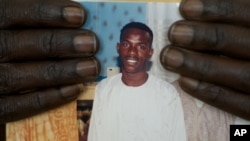Gay activists in Senegal claim politicians are jumping on the anti-gay bandwagon to rally support for parliamentary elections Sunday and a presidential vote in 2024.
Homosexuality has never been widely accepted in Senegal, a deeply conservative nation. But tensions have risen to new heights in recent months.
While some nonetheless have small but visible LGBTQ communities, in Senegal -- a country known for its hospitality, with a reputation for stability and the rule of law -- that is not the case.
Activists say anti-gay rhetoric has been ramped up since a May 2021 demonstration in the capital calling for gay sex -- currently punishable by up to five years in prison -- to be made a serious crime.
Senegal is not the only sub-Saharan state with laws against gay sex -- some two dozen others have them as well.
Khalifa, a bisexual, claims groups have been tracking down LGBTQ people and rights groups that help them and publicly denouncing them.
"In Senegal, there is no place for gays," he said. "When you hear the imams preach you just want to get on a plane and leave immediately."
Even though he is proud to be Senegalese and a practicing Muslim, he hopes to get asylum abroad.
Dakar has never had gay bars, LGBTQ community members say, but there were previously venues where they would meet and mingle alongside straight people without others knowing.
All that has stopped since the anti-gay march.
"It is riskier today to publicly display one's LGBTQI identity in Senegal compared to a few years ago," said Ousmane Diallo, an Amnesty International researcher.
Many in Muslim-majority Senegal believe homosexuality is a Western lifestyle being imposed on their society.
"I don't see how Senegal should change its position to give more space to these homosexuals," said Abdoulaye Guisse, a 28-year-old student, adding that LGBTQ people should remain "discreet".
"Socially it is not allowed -- religion is so strong in Senegal that it conditions our social practices."
Ababacar Mboup, who runs And Samm Jikko Yi, a group that helped organise last year's march, accused France of forcing its customs on Senegal when it does not accept Muslim practices such as polygamy within its borders.
He said he wants to stop the gay "lobby" from dominating mainstream Senegalese culture.
"If two homosexuals, holed up in their home, engage in their activities, that does not concern us -- but we really want to preserve Senegalese public space," he said, insisting his organisation is peaceful and does not condone mob violence.
For Senegalese gays, leaving may seem the best option, but it comes with its own challenges.
Daouda, 32, fled to a neighbouring country in 2016 and sometimes struggles to make ends meet.
"In Senegal living with homosexuality means being in danger from morning to night," he said.
He misses his family and would like to go home but believes he cannot so long as his father is alive.
"He took out a gun and wanted to shoot me -- if there weren't people in the house right then I would have died," he said. "He swore that he'd kill me if it's the last thing he does."




